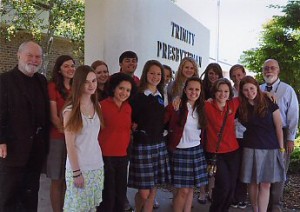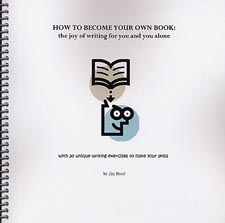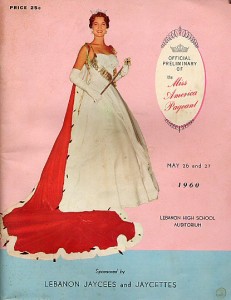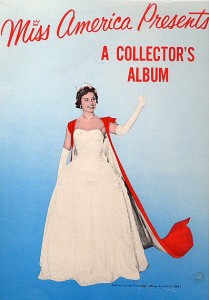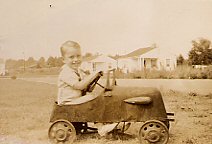
Me, in my first car.
Listen here: http://www.jimreedbooks.com/mp3/pedalcarafternoon.mp3 or read on…
The afternoon is blistery hot and the red bugs and flies are having a field
day on my bare ankles and arms. But the heat of the day and the radiant heat
from the metal of my pedal car aren’t noticed at all. That’s because I am
three years old and I have yet to understand that you’re supposed to spend
parts of each day commenting on and whining about bugs and heat and
humidity.
My mind is too clear, too uncluttered, to worry about such stuff.
What my mind is filled with is the sight of the sidewalk that runs from the
front steps of our small asbestos-shingled home to the asphalt pavement in
front of it. My pedal car is aimed toward the avenue, but my gaze is to the
right, toward 15th Street East and across it to the large high-fenced
federal medical and housing complex known as Northington Campus. That’s
where Daddy works all day, maintaining the buildings and sometimes talking
with the German prisoners of war who live there.
I’m waiting for Daddy to limp home from work, just a hundred yards from
here, but oh, so far away, since I am not allowed to leave the front yard
and even if I could, a hundred-yard trek would feel like crossing a damp
Sahara.
The pedal car squeaks as I work it back and forth on the sidewalk, and the
rusty steering wheel is hard to turn. No power steering invented yet. My
attention span snaps for a moment and I look across the avenue at the field
where my neighborhood playmates and I will be playing as we get older.
The golden grass is nearly three feet tall and it waves so gracefully in the
occasional breeze.
A bi-plane buzzes overhead, and I automatically salute it, a ritual drummed up by my sister and me. The patriotic thing to do—right now,during World War Two, while my uncles are overseas fighting—is to recognize the importance of aircraft, using them as a reminder to have fun, but not so much fun as to forget about all those soldiers and sailors and paratroopers and marines and WACS and WAVES and WAFS and Air Corps people and Coast Guarders who might die at any moment so that I can be safely riding my rusty pedal car each afternoon. Somewhere over yonder, my Uncle Buddy McGee is
fighting his way toward Germany. My Uncle Pat McGee is repairing some GI’s
wound, and the husbands and sons of our neighbors are each doing something
to help the war end sooner than never.
A black Model-A Ford automobile, as rusty and hard to steer as my pedal car,
turns off 15th Street onto Eastwood Avenue, my avenue, and pulls up to the
house next door. Pawpaw Burns gets out of the car and stoops under his
enormous tree to pick up a couple of pecans, which he cracks open with
one hand–something I won’t be able to do for a few more years. Pawpaw
regards me while he picks the sweet meat from the bitter shells.
“Whatcha doing, Master Jim?”
I blush, not expecting to be spoken to.
“Nothing,” I reply, and I vigorously pedal the car to show Pawpaw how robust
and strong I am—deserving to be called Master!
“Well, maybe you’ll be doing something later,” he jokes, adding, “It’s never
too late, you know.”
Pawpaw knows more about me than even my own family–I can tell that, because
he’s very old, and very old people are wiser than three-year-old people and
grown-up parents. I am embarrassed that he can read my mind, but I am awed by
his taking notice of me. I will regret many times not being old enough to
sit down with Pawpaw and hear his tales and feel his wisdom, and I will
often try to make amends for that loss by spending time with people older
than me. It’s never too late.
Pawpaw leisurely picks up a few more pecans and goes inside his home to see
what Mawmaw is up to.
I look up the avenue again to see if Daddy has appeared yet. I really am
looking up the avenue—not down—because it slants upward toward the street. I
will use this one-block incline to my advantage as I grow. It will be great
for coasting in a wagon. It will assist me when, on a windy day, I don
roller skates, grab Mother’s old umbrella, and let the wind fill that
umbrella and push me downhill for a block that feels like a mile.
“Clunk,” goes the manhole cover on the street before our house. It makes
that sound every time a car rolls over it, and I will hear that sound mixed
with the lonely mellow sound of a train whistle throughout many days and
nights on Eastwood Avenue.
Even now, in my book loft 55 miles and 60 years away from Eastwood Avenue, I
still hear that train whistle each day. It may even be the same train
whistle, because the engines seem to keep on rolling. It is the same
railroad track, I do know that. I have no way of knowing that in half a
century I will still be living and working by the same tracks that run by
Eastwood, having the same lonesome going-away feeling in my belly that I
have now, sitting here in this rusty pedal car.
I gaze at that field again, anxious to go hiding and adventuring among the
golden weeds. My brand-new baby brother, Ronny, is abed inside the house,
dreaming of warm milk and warm breasts. My older sister, Barbara, is
swirling crayons in her Shirley Temple coloring book, her artistic skills even now
pushing themselves into full view. Barbara’s coloring is full of shadings
and interpretations that kids like me can never achieve. It’s no fun for me,
coloring within the lines, but sister Barbara does it so well, I just know
she’s going to be a famous artist like my Aunt Matty Wooten in West Blocton.
I look at my small palms and marvel at the red dust and sweat that have made
themselves into clay in the folds and wrinkles and under the fingernails. I
wipe them on my short pants so that Barbara or Mother won’t make me wash
them.
Up the street, I see the figure of Daddy, and I scramble out of the pedal
car because it can’t go as fast as I can. My father limps from an old coal
mining accident. He wears khaki pants and a pith helmet, just like Jungle
Jim does in the movie serials. I race up the street and hug his leg, and
maybe this is the day he brings me a hand-made gift from one of the young
German soldiers. It’s a beautiful curved bottle with a painted figure
thereon, and we will keep this small treasure in the family from now on,
never knowing the name of the prisoner artist, but knowing that it is a
special and unearned gift from a stranger in a strange land to a family he
will never meet.
Daddy smells familiar and manly, as daddies usually do. A bit of coal dust
from the summer-dormant furnaces at Northington settles down and shakes its
essence up whenever Daddy and his workers move about. Some sweat—no
air conditioning in the hospital or the barracks. Some hair tonic fragrance,
but mainly the smell of Daddy. He picks me up high and my cheek rubs against
his swarthy, unshaved cheek, and I will forever remember that texture,
because there’s never been another experience like that. I don’t rub cheeks
with adult men, so my encounter with Daddy’s face is a fresh and uncluttered
encounter.
Mother actually starches and presses Daddy’s khaki trousers, so that he
starts each day fresh and tailored. He walks down the avenue with a small
three-year-old dancing around him, and we go inside our cave, smelling
cornbread cooking in a greased iron pan, turnip greens bubbling in their
sliced-egg broth, and freshly-fried chicken waiting for kids to fight over
drumsticks and pulley bone wishes.
The rock is rolled before the entrance of the cave to keep the sabre-toothed
tigers at bay, and our little Stone Age family huddles together to await the
fireflies, the purple-starred night, and the likes of Fibber McGee and Molly
crouching inside our radio set in the living room, getting ready to
entertain us before we leap fresh-toothbrushed into our hand-washed
bedclothes to sleep the only innocent and pure sleeps of our long lives.
Can I, the grizzled old memory-man, return to those days and wrap myself up
in their warm purity, and, once more, feel wanted and loved and cared for
and safe?
As Pawpaw Burns would say, still regarding me closely after all this time,
“It’s never too late.”
(C) 2012 A.D. by Jim Reed
jim@jimreedbooks.com
http://www.jimreedbooks.com
Twitter and Facebook

